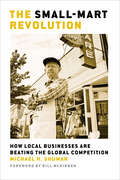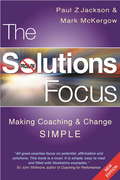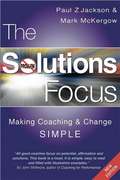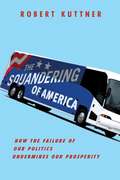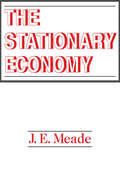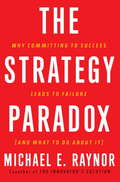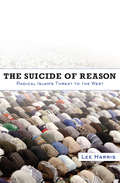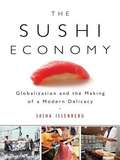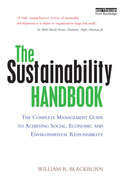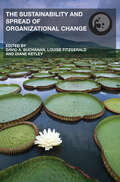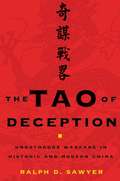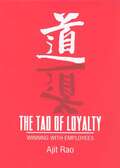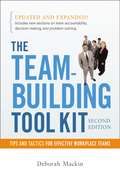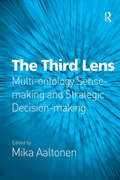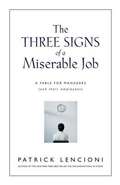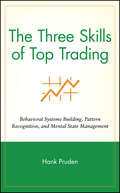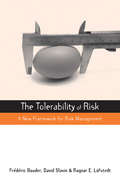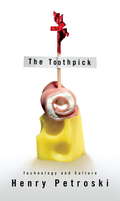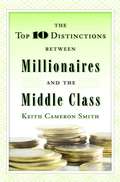- Table View
- List View
The Small-Mart Revolution: How Local Businesses are Beating the Global Competition (Bk Currents Ser.)
by Michael H ShumanDefenders of massive multinational chains like Wal-Mart and Fortune 500 big business argue that, like it or not, there is no alternative. Their huge scale and international reach, they claim, make them more efficient and profitable, better able to deliver value, and an uncontested boon for the job market. According to the big boys, locally owned small businesses are simply quaint remnants of the past, unable to compete in the global economy. But in ,em>The Small-Mart Revolution, Michael Shuman shows that the benefits these mega-stores and huge corporations supposedly deliver to communities are illusory. Crunch the numbers and you'll find that locally owned businesses turn out to be much more reliable generators of good jobs, economic growth, tax dollars, community wealth, charitable contributions, social stability, and political participation. Unlike their global competitors, they do this without massive tax breaks and subsidies that often put local economies in a permanent hole. Plus, contrary to popular belief, local businesses are competitive with the multinationals--and gaining ground every day. Shuman highlights numerous trends that are making the old "bigger is better" economies of scale argument obsolete, and he describes a variety of innovative strategies these businesses are using to successfully compete with their over-sized competitors. He also shows how consumers, investors, and policymakers can support their own communities by "going local." The Small-Mart Revolution offers a robust alternative to "go-go" globalization, one that nurtures the creative capacities of local businesses and enables communities everywhere to thrive.
The Solutions Focus
by Mark Mckergow Paul Z. JacksonAuthors Mark McKergow and Paul Jackson coach readers in the new methods of problem-solving. This revolutionary, practical alternative to traditional problem-solving processes will help readers identify what is working within an organization and amplify it-placing the focus on what is possible, rather than what isn't.
The Solutions Focus: Making Coaching and Change SIMPLE
by Mark MckergowThis is a new and updated edition of this acclaimed first business book on the powerful, simple yet subtle approach to positive change in people, teams and organisations. Used around the world by a wide range of people, professions and organisations, the first edition has now sold nearly 10,000 copies and been translated into 7 languages. Including new chapters reflecting the increasing importance of coaching and the solutions focus movement in the business environment, this wide-ranging book is filled with all the most important ideas, case examples and practical tips for managers, facilitators and consultants. Proven in many fields and with a distinguished intellectual heritage, "The Solutions Focus" provides a simple and direct route to progress in your organisation. It focuses on: solutions - not problems; in between: the action is in the interaction; make use of what's there; possibilities - past, present and future; and language. Every case is different. The trouble with traditional approaches to people problems is that they assume a straightforward relationship between cause and effect, between a problem and its solution. A solutions-focused approach sidesteps the search for the causes of a problem and heads straight for the solution, showing you how to envisage your preferred future and quickly takes steps forward. The authors present a set of practical techniques, including specific forms of questioning that lead to immediate action and results. They show how to identify what is working in your organisation and amplify it to make useful changes; to focus on what is possible rather than what is intractable and how to be solution focused, not solution forced.
The South Sea Company (A)
by David A. Moss Eugene Kintgen Agnieszka RafalskaIn early 1720, the South Sea Company and the Bank of England were competing for the right to issue new shares and to exchange those shares for government bonds that were then in the hands of the public. The British government had already executed two such debt conversion with the South Sea Company. Most individuals who had converted bonds for shares in 1711 and 1719 had seen their South Sea shares appreciate in the meantime, and the government had lowered its debt servicing costs as a result of these two conversions. The conversion under consideration in 1720, however, would be on a much larger scale. In time, the South Sea Company won the bidding war, and the House of Commons approved its debt conversion plan. Now it was up to the House of Lords to approve or reject the deal.
The Squandering of America: How the Failure of Our Politics Undermines Our Prosperity
by Robert KuttnerThe incomes of most Americans today are static or declining. Tens of millions of workers are newly vulnerable to layoffs and outsourcing. Health care and retirement burdens are increasingly being shifted from employers to individuals. Two-income families find they are working longer hours for lower wages, with decreased social support. As wealth has become more concentrated, the economy has become more recklessly speculative, jeopardizing not only the prospects of ordinary Americans, but the solvency of the entire system. What links these trends, writes Robert Kuttner in this provocative, engaging, and necessary book, is the consolidation of political and economic power by a narrow elite, who blocks the ability of government to restore broad prosperity to the majority of citizens. Kuttner--one of our most lucid economic critics--explores the roots of these problems and outlines a persuasive, bold alternative. InBusinessWeek,The Boston Globe, andThe American Prospect, he has established himself as a prophetic voice connecting economics and politics. Here he demonstrates how our economy has fallen hostage to a casino of financial speculation, creating instability as well as inequality. He debunks alarmist claims about supposed economic hazards, such as Social Security and Medicare, and exposes the genuine dangers: hedge funds and private equity run amok, sub-prime lenders, Wall Street middlemen, and America's dependence on foreign central banks. He describes how globalization of commerce has been used by business less to promote free trade than to escape the balanced regulation that delivered widespread abundance in the decades after World War II. While our financial security has weakened under President George W. Bush, Kuttner also faults many Democrats for failing to offer compelling alternatives. Now, with financial markets in crisis and public opinion supporting a more active role for government, he offers a new model of managed capitalism that can deliver security and opportunity, and rekindle democracy as a check on concentrated wealth. Here is a passionate, articulate naming of the problem and a call for reform. The Squandering of America sets out a path for reclaiming our democratic politics--and our prosperity.
The Stationary Economy
by J. E. MeadeJ. E. Meade was among the most distinguished of modern economists, noted for his contributions to economic theory and policy. This volume presents a series of models of economic systems, each built on greatly simplified assumptions about human motives, technology, and social institutions, and undertakes in each case a series of exercises to examine the links of causal relationship in each case. The Stationary Economy is a rigorous and elegant non-mathematical statement of the basic principles and problems of contemporary economic theory. The volume is based on models of systems in which there are no capital goods, and in which consumers' tastes, technical knowledge, and the size and composition of the population are static. This sophisticated restatement of the fundamentals of economic theory also deals with the basic methodological problems of economic analysis. Given the complexity of variables inherent in all economic systems, how is the economist to proceed in dealing with a particular set of interrelated problems? And further, how can the economist be confident that the verdict is more likely to be right than wrong? Meade considers these and other questions in a book important not only to professional economists and their students, but also to those more generally interested in economic policy.
The Strategy Paradox: Why Committing to Success Leads to Failure (and What to Do About It)
by Michael E. RaynorA compelling vision. Bold leadership. Decisive action. Unfortunately, these prerequisites of success are almost always the ingredients of failure, too. In fact, most managers seeking to maximize their chances for glory are often unwittingly setting themselves up for ruin. The sad truth is that most companies have left their futures almost entirely to chance, and don't even realize it. The reason? Managers feel they must make choices with far-reaching consequences today, but must base those choices on assumptions about a future they cannot predict. It is this collision between commitment and uncertainty that creates THE STRATEGY PARADOX. This paradox sets up a ubiquitous but little-understood tradeoff. Because managers feel they must base their strategies on assumptions about an unknown future, the more ambitious of them hope their guesses will be right - or that they can somehow adapt to the turbulence that will arise. In fact, only a small number of lucky daredevils prosper, while many more unfortunate, but no less capable managers find themselves at the helms of sinking ships. Realizing this, even if only intuitively, most managers shy away from the bold commitments that success seems to demand, choosing instead timid, unremarkable strategies, sacrificing any chance at greatness for a better chance at mere survival. Michael E. Raynor, coauthor of the bestselling The Innovator's Solution,explains how leaders can break this trade-off and achieve results historically reserved for the fortunate few even as they reduce the risks they must accept in the pursuit of success. In the cutthroat world of competitive strategy, this is as close as you can come to getting something for nothing. Drawing on leading-edge scholarship and extensive original research, Raynor's revolutionary principle of Requisite Uncertainty yields a clutch of critical, counter-intuitive findings. Among them: -- The Board should not evaluate the CEO based on the company's performance, but instead on the firm's strategic risk profile -- The CEO should not drive results, but manage uncertainty -- Business unit leaders should not focus on execution, but on making strategic choices -- Line managers should not worry about strategic risk, but devote themselves to delivering on commitments With detailed case studies of success and failure at Sony, Microsoft, Vivendi Universal, Johnson & Johnson, AT&T and other major companies in industries from financial services to energy, Raynor presents a concrete framework for strategic action that allows companies to seize today's opportunities while simultaneously preparing for tomorrow's promise.
The Structure of Financial Regulation (Routledge International Studies in Money and Banking)
by David G. Mayes Geoffrey E. WoodThis book examines the area of financial regulation in the banking sector. Editors Mayes and Wood bring together such acadmics as Charles Goodhart, Charles Calomiris and Kern Alexander whose expertise shines through this volume to provide a reference tool for researchers, students and bankers themselves which will prove invaluable.
The Suicide of Reason: Radical Islam's Threat to the West
by Lee HarrisFrom a ?startlingly original and visionaryOCO writer ("Salon"), a disturbing and far-ranging look at the WestOCOs vulnerability to fanaticism.
The Sushi Economy: Globalization and the Making of a Modern Delicacy
by Sasha IssenbergThe highly acclaimed exploration of sushi's surprising history, global business, and international allure One generation ago, sushi's narrow reach ensured that sports fishermen who caught tuna in most of parts of the world sold the meat for pennies as cat food. Today, the fatty cuts of tuna known as toro are among the planet's most coveted luxury foods, worth hundreds of dollars a pound and capable of losing value more quickly than any other product on earth. So how did one of the world's most popular foods go from being practically unknown in the United States to being served in towns all across America, and in such a short span of time? A riveting combination of culinary biography, behind-the- scenes restaurant detail, and a unique exploration of globalization's dynamics, the book traces sushi's journey from Japanese street snack to global delicacy. After traversing the pages of The Sushi Economy, you'll never see the food on your plate--or the world around you--quite the same way again.
The Sustainability Handbook: The Complete Management Guide to Achieving Social, Economic and Environmental Responsibility
by William R. BlackburnThe Sustainability Handbook covers all the challenges, complexities and benefits of sustainability for businesses, governments and other organizations. It provides a blueprint for how organizations can reach or exceed economic, social and environmental excellence. It offers a host of practical approaches and tools including a model sustainability policy for organizations, summaries of sustainability codes and tips on selecting them, an extensive collection of metrics and a wealth of supplementary reference material. This is the essential reference for every organization in pursuit of sustainability.
The Sustainability and Spread of Organizational Change: Modernizing Healthcare (Routledge Studies in Organizational Change & Development)
by David A. Buchanan Louise Fitzgerald Diane KetleyThis important book examines issues affecting the sustainability and spread of new working practices. The question of why good ideas do not spread, ‘the best practices puzzle’, has been widely recognized. But the ‘improvement evaporation effect’, where successful changes are discontinued, has attracted less attention. Keeping things the way they are has been seen as an organizational problem to be resolved, not a condition to be achieved. This is one of the first major studies of the sustainability of change focusing on the example of the NHS, by a unique team of health service and academic researchers. The findings may apply to a variety of other settings. The agenda set out in 2000 in The NHS Plan is perhaps the largest organization development programme ever undertaken, in any sector, anywhere. The NHS thus offers a valuable ‘living laboratory’ for the study of change. This text shows that sustainability and spread are influenced by a range of issues - contextual, managerial, political, individual, and temporal. Developing a processual perspective, this fresh analysis considers policy implications, and strategies for managing sustainability and spread. This book will be essential reading for students, managers, and researchers concerned with the effective implementation of organizational change.
The Synthesizing Mind: Harnessing Its Power for Success
by Howard GardnerAs this chapter stresses, the ability to knit together information from disparate sources into a coherent whole is a vital leadership capability in our information-heavy culture.
The Tao of Deception: Unorthodox Warfare in Historic and Modern China
by Ralph D. SawyerThe history of China is a history of warfare. Wars have caused dynasties to collapse, fractured the thin façade of national unity, and brought decades of alien occupation. But throughout Chinese history, its warfare has been guided by principles different from those that governed Europe. Chinese strategists followed the concept, first articulated by Sun-tzu in The Art of War, of qi (ch'i), or unorthodox, warfare. The concept of qi involves creating tactical imbalances in order to achieve victory against even vastly superior forces. Ralph D. Sawyer, translator of The Art of War and one of America's preeminent experts on Chinese military tactics, here offers a comprehensive guide to the ancient practice of unorthodox warfare. He describes, among many other tactics, how Chinese generals have used false rumors to exploit opposing generals' distrust of their subordinates; dressed thousands of women as soldiers to create the illusion of an elite attack force; and sent word of a false surrender to lure enemy troops away from a vital escape route. The Tao of Deception is the book that military tacticians and military historians will turn to as the definitive guide to a new, yet ancient, way of thinking about strategy.
The Tao of Loyalty: Winning with Employees (Response Books)
by Ajit RaoIn today′s business environment, people, rather than products, technology and processes, are increasingly becoming the crucial factor in differentiating profitable organizations from those that are not. It is therefore important to understand employee commitment and loyalty in organizations. This book begins by defining loyalty, the types of loyalty (emotional and behavioural) and how these can be measured and interpreted. The author discusses the potency of combining the two types of loyalty to segment employees into different categories which can then yield loyalty rankings. He goes on to discuss the elements that can be tweaked and managed and which impact on the loyalty scores of an employee. This book concludes with the processes involved in building accountability in order to ensure that everyone in the organization is aligned to, and expends energy in, building employee loyalty.
The Team-Building Tool Kit: Tips and Tactics for Effective Workplace Teams
by Deborah MackinThis helpful guide provides practical advice to guide team coaches, leaders, and members to high-performance results.Workplace teams learn to function as effective units when they have the tools and techniques to be greater than the sum of their parts. Filled with bullet points to make tips and strategies quick and easy to grasp, this book covers both the structure and nitty-gritty process details that so often derail even the best teams.In The Team-Building Tool Kit, you will learn how to:have effective team meetingsimprove accountability for results and team member behaviorassess team performanceresolve team conflictsrecognize the pitfalls that affect decision makingtrain for high performancedesign a plan for implementation Featuring new sections on team accountability, decision making, and problem solving, The Team-Building Tool Kit is a must-have for every team library.
The Third Lens: Multi-ontology Sense-making and Strategic Decision-making
by Mika AaltonenAdvancing new sense-making tools for organizational strategy, this book demonstrates how to deal with asymmetric threats and opportunities. It employs participatory methods and multiple sector strategies to shift strategic thinking into considering disorder complexity and chaos. The contributors examine whether the 'third lens' or ontology of a project (its nature, work and strategic landscape) should influence the two other 'lenses' (our epistemological and methodological choices) that create an understanding of the world we live in. The book also considers the importance of time, in particular spatio-temporal relations that serve as reflection points for sense-making and strategic decision-making, both with respect to the situation in which they take place and as conceptual vehicles for managing multiple times and realities. Written for 21st century strategists, this volume will benefit people and organizations who struggle daily with multiple co-existing ontological, epistemological and methodological discourses.
The Three Signs of a Miserable Job
by Patrick M. LencioniA bestselling author and business guru tells how to improve your job satisfaction and performance. In his sixth fable, bestselling author Patrick Lencioni takes on a topic that almost everyone can relate to: the causes of a miserable job. Millions of workers, even those who have carefully chosen careers based on true passions and interests, dread going to work, suffering each day as they trudge to jobs that make them cynical, weary, and frustrated. It is a simple fact of business life that any job, from investment banker to dishwasher, can become miserable. Through the story of a CEO turned pizzeria manager, Lencioni reveals the three elements that make work miserable -- irrelevance, immeasurability, and anonymity -- and gives managers and their employees the keys to make any job more fulfilling. As with all of Lencioni?s books, this one is filled with actionable advice you can put into effect immediately. In addition to the fable, the book includes a detailed model examining the three signs of job misery and how they can be remedied. It covers the benefits of managing for job fulfillment within organizations -- increased productivity, greater retention, and competitive advantage -- and offers examples of how managers can use the applications in the book to deal with specific jobs and situations. Patrick Lencioni (San Francisco, CA) is President of The Table Group, a management consulting firm specializing in executive team development and organizational health. As a consultant and keynote speaker, he has worked with thousands of senior executives and executive teams in organizations ranging from Fortune 500 companies to high-tech startups to universities and nonprofits. His clients include AT&T, Bechtel, Boeing, Cisco, Sam?s Club, Microsoft, Mitsubishi, Allstate, Visa, FedEx, New York Life, Sprint, Novell, Sybase, The Make-A-Wish Foundation, and the U. S. Military Academy at West Point. Lencioni is the author of six bestselling books, including The Five Dysfunctions of a Team. He previously worked for Oracle, Sybase, and the management consulting firm Bain & Company.
The Three Skills of Top Trading
by Hank PrudenPraise for The Three Skills of Top Trading"Professor Pruden's new book, The Three Skills of Top Trading, is unquestionably the best book on a specific trading method and the necessary attributes for trading that I have read. His logic, understanding of human foibles, and use of the Wyckoff method of trading are broadly referenced, readable, understandable, and entertaining."- Charles D. Kirkpatrick, II, CMT, coauthor ofTechnical Analysis: The Complete Resource for Financial Market Technicians, Editor of the Journal of Technical Analysis, and board member of the Market Technicians Association"At long last, someone has taken the time and effort to bring the work and insight of Wyckoff to wider public attention-and Hank Pruden has done so masterfully, with great clarity and eloquence. Hank has taken the best of Wyckoff's work, combining it with the essential aspects of trader discipline and psychology, to provide a highly readable and particularly useful guide to trading. MUST READING!"- Jacob Bernstein, www.trade-futures.com"Hank Pruden puts all of the elements needed for successful trading into one volume. This book not only belongs on every trader's shelf but should be close enough for continuous reference."- Martin J. Pring, President, www.Pring.com"Dr. Pruden has brought together his lifetime of work in developing a modern approach to analyzing and trading the markets built upon classic market analysis from the early part of the twentieth century and topped off with modern-day tenets of behavioral finance and mental state management."- Thom Hartle, Director of Marketing for CQG, Inc. (www.cqg.com)"I usually consider a book to be well worth reading if it gives me one paradigm shift. I believe that this book will give the average investor a lot more than just one."- Van K. Tharp, PhD, President, Van Tharp Institute
The Tolerability of Risk: A New Framework for Risk Management (Earthscan Risk In Society Ser.)
by David Slavin Ragnar E. Löfstedt Frédéric BouderThere is an increasing dissatisfaction about how risk is regulated, leading to vivid debates about the use of 'risk assessment' and 'precaution'. As a result, academics, government officials and industry leaders are calling for new approaches and fresh ideas. This book provides a historical and topical perspective on the alternative concept of 'Tolerability of Risk' and its concrete regulatory applications. In the UK, Tolerability of Risk has been developed into a sophisticated framework, particularly within the health and safety sectors. It is expected to guide decision-makers when applying their legal obligation of keeping risks as low as practically reasonable. Could Tolerability of Risk become a wider source of inspiration across the full scope of risk analysis and management? Written by leading academics and risk practitioners from industry and government, The Tolerability of Risk presents a summary of theoretical perspectives on risk approaches, providing a detailed elicitation of the methods and approaches used to build the Tolerability of Risk framework and examining the prospect of universal application of that framework. From nuclear power to environmental pollution, climate change and drug testing, the Tolerability of Risk framework may offer a workable, pragmatic solution for balancing risks against the costs involved in controlling them, as well as developing the institutional capacity to make effective decisions in all jurisdictions worldwide.
The Toothpick
by Henry PetroskiA celebration culture and technology, as seen through the history of the humble yet ubiquitous toothpick, from the best-selling author of The Pencil.From ancient Rome, where emperor Nero made his entrance into a banquet hall with a silver toothpick in his mouth, to nineteenth-century Boston, where Charles Forster, the father of the American wooden toothpick industry, ensured toothpicks appeared in every restaurant, the toothpick has been an omnipresent, yet often overlooked part of our daily lives. Here, with an engineer's eye for detail and a poet's flair for language, Henry Petroski takes us on an incredible tour of this most interesting invention. Along the way, he peers inside today's surprisingly secretive toothpick-manufacturing industry, and explores a treasure trove of the toothpick's unintended uses and perils, from sandwiches to martinis and beyond.From the Trade Paperback edition.
The Toothpick
by Henry PetroskiA celebration culture and technology, as seen through the history of the humble yet ubiquitous toothpick, from the best-selling author of The Pencil.From ancient Rome, where emperor Nero made his entrance into a banquet hall with a silver toothpick in his mouth, to nineteenth-century Boston, where Charles Forster, the father of the American wooden toothpick industry, ensured toothpicks appeared in every restaurant, the toothpick has been an omnipresent, yet often overlooked part of our daily lives. Here, with an engineer's eye for detail and a poet's flair for language, Henry Petroski takes us on an incredible tour of this most interesting invention. Along the way, he peers inside today's surprisingly secretive toothpick-manufacturing industry, and explores a treasure trove of the toothpick's unintended uses and perils, from sandwiches to martinis and beyond.From the Trade Paperback edition.
The Toothpick: Technology and Culture
by Henry PetroskiLike The Pencil, Henry Petroski's The Toothpick is a celebration of a humble yet elegant device. As old as mankind and as universal as eating, this useful and ubiquitous tool finally gets its due in this wide-ranging and compulsively readable book. Here is the unexpected story of the simplest of implements--whether made of grass, gold, quill, or wood--a story of engineering and design, of culture and class, and a lesson in how to discover the extraordinary in the ordinary. Petroski takes us back to ancient Rome, where the emperor Nero makes his entrance into a banquet hall with a silver toothpick in his mouth; and to a more recent time in Spain, where a young señorita uses the delicately pointed instrument to protect her virtue from someone trying to steal a kiss. He introduces us to Charles Forster, a nineteenth-century Bostonian and father of the American toothpick industry, who hires Harvard students to demand toothpicks in area restaurants--thereby making their availability in eating establishments as expected as condiments. And Petroski takes us inside the surprisingly secretive toothpick-manufacturing industry, in which one small town's factories can turn out 200 million wooden toothpicks a day using methods that, except for computer controls, haven't changed much in almost 150 years. He also explores a treasure trove of the toothpick's unintended uses and perils, from sandwiches to martinis and beyond. With an engineer's eye for detail and a poet's flair for language, Petroski has earned his reputation as a writer who explains our world--from the tallest buildings to the lowliest toothpick--to us.
The Top 10 Distinctions Between Millionaires and the Middle Class
by Keith Cameron SmithRevealing the knowledge of some of the most successful people on the planet, this title leads readers to the path to becoming both rich and happy. It explains how to develop perseverance and overcome obstacles, embrace change and profit from it, take calculated risks and avoid regrets, and more.
The Top 10 Distinctions Between Millionaires and the Middle Class
by Keith Cameron SmithIf you're ready to take the journey to wealth and personal fulfillment, here's your ticket. In this life-changing little book, entrepreneur and inspirational speaker Keith Cameron Smith shows you how to think like a millionaire and reap the benefits of a millionaire mindset. The key to moving beyond the middle class and up the economic ladder is mastering ten vital principles, including* Millionaires think long-term. The middle class thinks short-term. Create a clear vision of the life you desire, and focus on it.* Millionaires talk about ideas. The middle class talks about things and other people. Ask some positive "what if" questions every day, and bounce ideas off successful people who will be honest with you.* Millionaires work for profits. The middle class works for wages. Take calculated risks and learn to take advantage of good opportunities.We all want to improve our financial position. In this inspirational and practical guide filled with savvy and sensible advice, Smith upgrades you from coach to first class. So follow these principles, transform your life, and realize your dreams!From the Hardcover edition.
